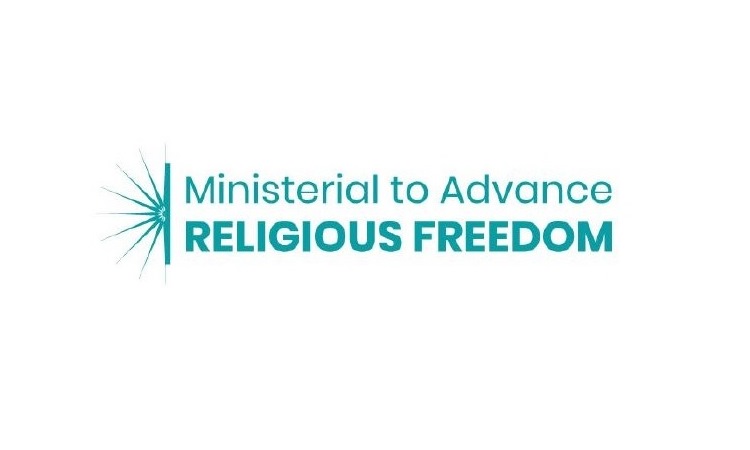It was supposed to be one of those rare, heartwarming moments in Washington: Two officials—one appointed by House Speaker Nancy Pelosi, the other by President Donald Trump—sitting together on a panel, agreeing to agree. This week, the State Department convened its largest-ever gathering dedicated to human rights, the Ministerial to Advance Religious Freedom. Two members of the bipartisan United States Commission on International Religious Freedom, Anurima Bhargava and Johnnie Moore, had come together to discuss the disturbing persecution of religious minorities around the world.
But amid the week’s roundtable discussions and lofty speeches about America’s dedication to defending unalienable rights worldwide, the reality of what’s been happening within U.S. borders was hard to ignore. The news has been filled with images of migrant children taken from their parents and denied access to soap, toothpaste, or beds; of migrant men detained in areas so crowded, they can’t lie down. At a Trump rally in North Carolina this week, attendees booed at mentions of Representative Ilhan Omar of Minnesota, who was born in Somalia and came to the U.S. as a refugee, and chanted “Send her back.” The Trump administration is reportedly considering a proposal to virtually shut down refugee admissions next year.
When I asked Bhargava and Moore, who have been charged as the country’s watchdogs for some of the worst violence around the world, whether the United States has recently lived up to the human-rights standards it sets for other countries, Bhargava paused and said, “No.” As the Trump administration pushes a diplomatic agenda framed in the language of human rights, it is haunted by the same contradictions that have always defined America, a nation perpetually falling short of its aspiration to be a shining city on a hill.
Serwer: What Americans do now will define us forever
The State Department recently introduced special training for foreign-service officers on issues of religious persecution. Hundreds of millions of dollars have been pledged to help religious minorities rebuild their communities in northern Iraq following the Islamic State’s 2014 invasion, and this week, Secretary of State Mike Pompeo announced $27 million more in aid to the region. Pompeo recently convened a group of scholars to lead a new Commission on Unalienable Rights, dedicated to reclaiming the fundamental principles of human rights from the twisted and abusive way they are used by regimes like that in Iran.
In an address to the ministerial yesterday, Pompeo extolled America’s example to the world. “Here in the United States, our Declaration of Independence clearly states that certain rights are unalienable,” he said. “There are liberties to which all of mankind, in all places, at all times are entitled.” Later in the day, Vice President Mike Pence echoed his commitment to defending fundamental rights. “We are proud that our long tradition of inspiring other nations to embrace religious freedom and respect for human rights has ushered in important improvements in the lives of people around the world,” he said. “Those who reject religious freedom are more likely to breed radicalism and resentment … And those who deny religious freedom to their own people have few qualms denying those rights to others.”
At least rhetorically, this message has consistently defined the Trump administration’s approach to foreign policy. Officials have argued that basic liberties, and especially freedom of conscience, provide the basis for healthy, stable societies. The United States should promote these liberties, they say, not just because they are essential to the country’s founding, but because they make good foreign-policy sense.
Read: The ‘religious freedom’ agenda
A big part of diplomacy, however, is credibility—America modeling the values it preaches. International religious freedom is one of the last bipartisan issues in Washington; even Pelosi, one of the administration’s most powerful Democratic foes, spoke at this week’s ministerial. But when it comes to those harder questions, about the United States’s own human-rights record, that bipartisan unity tends to break down. Those cracks showed through at the ministerial, even at supposedly bland panel events.
“The rhetoric we’re seeing right now … of who belongs, and why they belong, is something that is extraordinarily painful,” said Bhargava, one of the USCIRF commissioners appointed by Pelosi, who served in the Department of Justice under Barack Obama. “If we aren’t able to find ways in which we hold up our pluralism, our diversity … as a strength, and instead use it as a way to divide, I think we’re in great trouble.”
Pompeo’s new Commission on Unalienable Rights has a lofty mission: Members have been charged with providing “fresh thinking about human rights … where it has departed from our nation’s founding principles of natural law and natural rights, to which Lincoln called us at Gettysburg and to which King called us while standing in front of the Lincoln Memorial on the Mall in Washington, D.C.” In one sense, this aspiration to grand thinking is definitional to the American project—in keeping with Trump’s slogan, it is part of what makes America great.
But in the end, a nation is not judged by its conferences and commissions. As the United States renews its commitment to promoting global religious freedom, it remains tortured by conflicts at home. As Bhargava put it: “America, like many places around the world, has work to do.”
Read the article on The Atlantic website.
Emma Green is a staff writer at The Atlantic, where she covers politics, policy, and religion.



